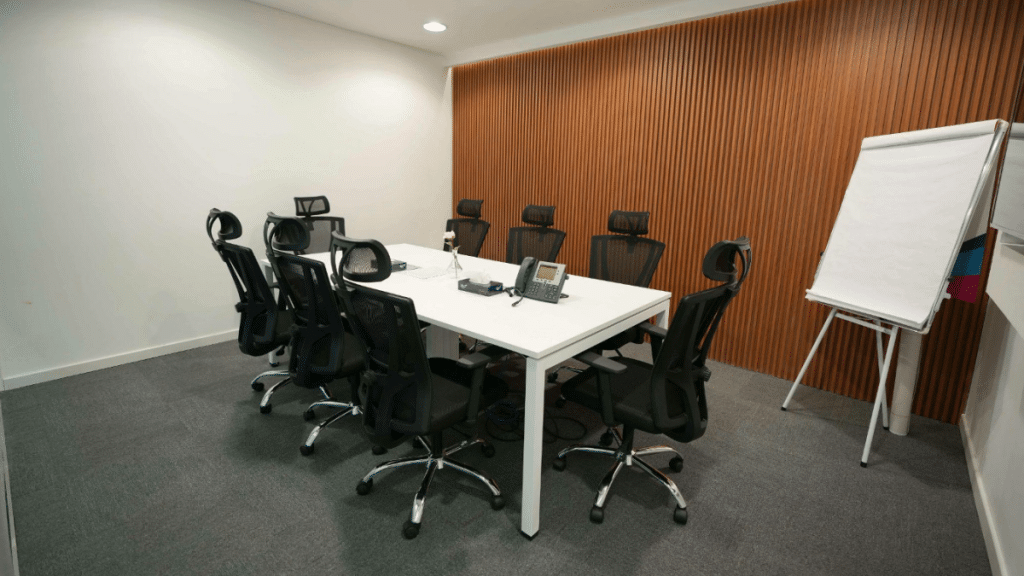In the bustling corporate world, a quiet office environment is essential for productivity and employee well-being. However, many offices in the UK are plagued by noise pollution from various sources, including traffic, neighbouring offices, and even internal office noise. Fortunately, there are effective soundproofing solutions available to address these issues.
Soundproofing existing office walls and ceilings can transform your workspace into a tranquil haven. This article explores the best methods for soundproofing, focusing on the benefits of soundproof panels for walls, acoustic ceiling panels, and acoustic foam.
Understanding Soundproofing
Soundproofing refers to the process of making a space resistant to the transmission of sound. This can be achieved by using materials and techniques that either absorb sound waves or block them from passing through surfaces like walls, ceilings, and floors. In an office setting, effective soundproofing can significantly reduce distractions and create a more focused work environment.
Effective Soundproofing Solutions
Soundproof Panels for Walls
Soundproof panels for walls are designed to block and absorb sound. They come in various materials, such as foam, fiberglass, and mineral wool, each offering different levels of sound absorption and insulation.

- Foam Panels: Lightweight and easy to install, foam panels are a popular choice for many office spaces.
- Fiberglass Panels: These provide excellent sound absorption and are ideal for larger office spaces.
- Mineral Wool Panels: Known for their superior sound-blocking capabilities, mineral wool panels are perfect for high-noise environments.
Acoustic Ceiling Panels
Acoustic ceiling panels are essential for reducing noise from above, such as footsteps from upper floors or loud HVAC systems. These panels are typically made from materials like fiberglass or foam and are installed in a suspended ceiling grid.

- Drop Ceiling Tiles: These are easy to install and replace, making them a practical option for many offices.
- Baffles and Clouds: These hanging panels are great for larger open-plan offices, offering both sound absorption and aesthetic appeal.
Acoustic Foam
Acoustic foam sheets is a versatile soundproofing material that can be used on walls, ceilings, and even furniture. It is especially effective at absorbing mid to high-frequency sounds, making it a great option for reducing office noise.

- Egg Crate Foam: Known for its distinctive shape, this foam is excellent at diffusing sound waves.
- Pyramid Foam: This type of foam offers a unique look and effective sound absorption.
Steps to Soundproof Your Office
- Assess the Noise Problem: Identify the main sources of noise and the areas most affected.
- Choose the Right Materials: Select soundproofing materials that best suit your needs and budget.
- Prepare the Space: Clear the area where the soundproofing materials will be installed.
- Install the Materials: Follow the manufacturer’s instructions for installing soundproof panels, acoustic ceiling panels, and acoustic foam.
- Test the Results: After installation, check the noise levels to ensure the soundproofing is effective.
Benefits of Soundproofing Your Office
Improved Productivity
Noise is a major distraction in the workplace. By soundproofing your office, you can create a quieter environment that allows employees to concentrate better and be more productive.
Enhanced Privacy
Soundproofing helps keep conversations private, which is crucial for maintaining confidentiality in meetings and phone calls.
Better Acoustics
Soundproofing materials can also improve the overall acoustics of a room, reducing echo and making it easier to communicate clearly.
Cost Considerations
The cost of soundproofing an office can vary widely depending on the size of the space and the materials used. Here are some general cost estimates:
- Soundproof Panels for Walls: £20-£50 per panel
- Acoustic Ceiling Panels: £5-£30 per square meter
- Acoustic Foam: £10-£30 per sheet
It’s important to consider both the upfront costs and the long-term benefits, such as improved productivity and employee satisfaction.
Best Practices for Soundproofing
- Seal Gaps and Cracks: Ensure that doors, windows, and walls are properly sealed to prevent sound leakage.
- Use Thick Curtains and Carpets: These can help absorb sound and reduce noise levels.
- Arrange Furniture Strategically: Place bookshelves and large furniture against walls to add an extra layer of sound absorption.
Conclusion
Transform Your Office Environment
Soundproofing your office walls and ceilings can significantly enhance your workspace by reducing noise and creating a more productive, private, and pleasant environment. By investing in soundproof panels for walls, acoustic ceiling panels, and acoustic foam, you can effectively tackle noise pollution and improve the overall work experience for everyone in the office.
Frequently Asked Questions
How effective are soundproof panels for walls?
Soundproof panels are highly effective at reducing noise when installed correctly. They work by absorbing and blocking sound waves, making them an excellent choice for office soundproofing.
Can I install acoustic ceiling panels myself?
Yes, many acoustic ceiling panels are designed for easy installation and can be installed by anyone with basic DIY skills. However, for more complex installations, it may be best to hire a professional.
Is acoustic foam better than other soundproofing materials?
Acoustic foam is great for absorbing sound, especially mid to high-frequency noises. However, for comprehensive soundproofing, it is often best used in combination with other materials like soundproof panels and acoustic ceiling panels.
How much does it cost to soundproof an entire office?
The cost can vary widely based on the size of the office and the materials used. On average, you might spend anywhere from a few hundred to several thousand pounds.
Where can I buy soundproofing materials in the UK?
You can purchase soundproofing materials from various suppliers, both online and in-store. Best option is https://acousticpanels.co.uk/.
By following the guidelines and tips in this article, you can effectively soundproof your office and create a better working environment for everyone.
